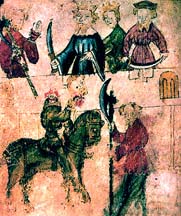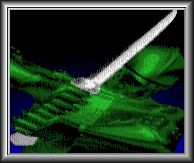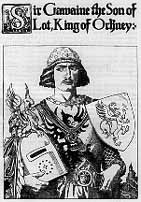



 
|
One of the most important components of any literary work is the central character. To make literature truly great is to have a character whose personality is believable. When the character is believable, the reader is more likely to relate to the character and be drawn into the work. There are three basic ways a character's personality can be revealed to a reader: what the character thinks about him or herself, how others think and feel about the character, and the character's actions help define his or her personality. When these three methods are in sync, then the character becomes a real person. However it is very easy for a writer to make the character become too perfect and the illusion of reality is lost. The way an author can work around this is to allow certain aspects to become out of sync, such as a flaw in personality which can only be brought to light when the character is pushed to his limits. This is how the personality of Sir Gawain, the central character of Sir Gawain and the Green Knight, is depicted. Sir Gawain and the Green Knight is a great medieval poem written by an unknown author who is believed to be a contemporary of Chaucer. The poem takes place in Arthurian England. Sir Gawain begins his rise to greatness when he takes a challenge given by an ominous figure known as the Green Knight. Throughout the poem, Gawain is tested and is found to be truthful until he is tested in the gift-giving game in which his flaw is revealed to the reader. The events in the poem make the character of Sir Gawain very believable and is part of the reason why Sir Gawain and the Green Knight is one of the greatest literary works of Middle English. In the first segment of the poem, we are introduced to Sir Gawain and the Green Knight. It is Christmas time in King Arthur's court when the Green Knight enters the dining hall. He is very large and completely green. He challenges the court to a beheading game in which one of the knights must cut off the Green Knight's head and then in 12 months and a day find the Green Knight and allow the Green Knight to chop his head off. When none of the knights of the Round Table take up his challenge, he taunts them and says, "What, is this Arthur's house.../Whose fame so fair in far realms and wide?/Where is now your arrogance and awesome deeds./Your valor and your victories and your vaunting words?/.../Overwhelmed with a word of one man's speech./For all cower and quake, and no cut felt!"(208-209). This angers Arthur and he gets up to take the challenge. This is the point where we see the first glimpse of Sir Gawain's character. Sir Gawain asks Arthur to allow him to take the challenge. We see how Sir Gawain feels about himself when he gives his reasons for being allowed to take the challenge. Sir Gawain tells Arthur that he is "..the weakest, well I know, and wit feeblest;/And the loss of my life will be the least of any" (208). Sir Gawain does not think highly of himself and feels that the only reason he is a knight of Arthur's court is because he is Arthur's nephew. His takeing of the challenge is seen as a deed of selflessness and not one of pride. This combined with the fact that none of the other knights are willing to take the challenge causes Gawain to be seen as the greatest of all knights. After Gawain beheads the Green Knight, he must complete the challenge by seeking out the Green Knight in one year's time and allowing the Green Knight to chop off his head. When it comes time for Gawain to leave for his journey, all of the knights in king Arthur's court come to see him leave. This is when Gawain's bravery is revealed when he says "'Why should I tarry?' and smiled/with tranquil eye/ 'In destinies sad or merry/True men can but try"(214). Gawain shows how he is unafraid of facing his destiny. Gawain is dressed in the finest armor. The author points out the shield he is given which has the five-pointed star of Solomon on the face and a picture of St. Mary on the back. The five-pointed star of Solomon symbolizes truth, and the author writes that Gawain is worthy of it(215). He leaves Arthur's court around the beginning of November. This means that Sir Gawain has to bear the worst of weather, traveling around and looking for the Green Chapel where he must meet the Green Knight. He travels on horseback in his armor and never turns back. This, in itself, show his perserverance and dedication. In the next segment of the poem, Gawain finds a castle in the middle of a mist. The castle seems to appear by magic after Sir Gawain prays for a place to stay and enjoy the Yule time feast. When he enters the castle, he is greeted warmly. Gawain doesn't announce who he is and is asked questions about who he is, and where he came from, during dinner. When the lord of the castle finds out who he is the author writes "Then laughed he loudly, so elated he was/And the men in that household made haste with joy/To appear in his presence promptly that day./That of courage ever-constant, and customs pure,/Is pattern and paragon, and praised without end:/Of all the knights on earth most honored is he"(221). A part of Gawain's character which is perceived by others is that he is very courteous and well mannered. This is shown by the author as false when two ladies enter the room. The first lady is an old hag to whom Sir Gawain courteously bows. The second is a beautiful young woman whom he takes in his arms and gives a kiss. This is not the proper way to greet royalty. This shows the reader that Sir Gawain is perhapse not all he appears to be. The lord of the castle challenges Gawain to a game of gifts where the lord will give Gawain whatever he catches during the day and Gawain must give the lord whatever he gains during the day. Gawain must also remain in the castle and enjoy himself. The game is actually a test of Gawain's honesty. Gawain accepts the challenge in exchange for the lord giving him directions to the Green Chapel. On the first day the lady of the castle enters Gawain's room and begins seducing Gawain. The seduction is subtle and does not become physical. Gawain is able to get out of harm's way and receives a single kiss form the lady. When the lord returns to the castle he gives Gawain the deer he has caught. As agreed, Gawain gives the lord the kiss he has received from the lady. On the second day, the lady returns to Gawain's room and begins the seduction again. This time the seduction takes the form of a cat-and-mouse game of words. Gawain again is able to fend off the advances of the lady without being rude and receives two kisses from the lady. the lord returns from his hunt and gives Gawain a boar. Gawain then gives him the two kisses he has received from the lady. Up to now, Gawain has been truthful and given to the lord all he has received. The third day is when he gets into trouble. The day starts off with Gawain's nightmares about his impending fate looming over his head. He must bear the stroke of the Green Knight on the next day and is beginning to fear for his life. The lady enters his room, wearing a seductive dress, while poor Gawain sleeps. The seduction is now overt as she lays directly on top of Gawain. They begin to kiss when Gawain realizes that it is wrong and stops. The lady accepts Gawain's refusal and offers him a ring to remember her by. Gawain refuses to take the ring because he has nothing of value to give her in exchange. She offers him her green belt and says "For the man that possed this piece of silk/If he bore it on his body, belted about./There is no hand under heaven that could hew him down,/For he could not be killed by any craft on earth"(240). This is a direct play on his fears and "Then the man began to muse, and mainly he thought/It was a pearl for his plight, the peril to come/When he gains the Green Chapel to get his reward:/Could he escape unscathed, the scheme were nobel!"(240). Thus Gawain accepts the belt. The lord returns home and gives Gawain a fox. Gawain gave him the three kisses which he received from the lady, but not the belt. This is the flaw in his personality which makes him a believable character. Any normal person, no matter how honest, would do what he has done for fear of his life. This fact makes Gawain look very real and makes him human. Gawain then says, "'Never trouble about the terms' he returned at once,/'Since all I owe here is openly paid"(242). This is the lie which comes from the pressure Gawain is under since he is now trapped. Gawain later takes his leave and is sent with a guide to travel to the Green Chapel. There is yet another test when the guide tries to talk Gawain out of going by telling him "...let the grim man be;/Go off by some other road, in God's own name!/Leave by some other land, for the love of Christ./...I Shall.../...conceal this day's deed, nor say to a soul/That ever you fled for fear from any that I knew"(246). Gawain refuses to take the guide's advice and heads off to face the Green Knight. In the last segment of the poem, the Green Knight takes his turn in the beheading game, and Gawain faces his fate. As Gawain comes closer to the Green Chapel, he hears the Green Knight sharpening his axe. The author describes the sound as a "barbarous din"(247). Gawain does not shrink from the sound and calls out. He is then greeted by the Green Knight and the two get down to the business at hand. As the Green Knight takes the first strike, Gawain looks up at him. The Green Knight stops in mid-swing and taunts him. Gawain replies "...strike once more;/I shall neither flinch nor flee;/But if my head falls to the floor/There is no mending me!"(249). Gawain is trying his best to be brave but is having but he knows of his mortality and is afraid. On the second stroke, Gawain remains perfectly still and the Green Knight stops again to taunt him. Gawain becomes very angry and says "Why, thrash away, tyrant, I tire of your threats;/you make such a scene, you must frighten yourself"(249). This is unlike Gawain to burst out in such rough tones. He is seen now not as the one who speaks the tongue of love. He seems more human as the Green Knight delays the inevitable. The third and final strike grazes Gawain's neck. Gawain gets up and grabs his sword to defend himself from any more assaults. At this point, the Green Knight explains to him what the strokes meant. The first feign is for the first night of the gift giving game where he is honest. The second feign was for the second night where Gawain again is honest. The third blow is for the last night where his loyalty falteres. However, his untruth is "not cunning, nor courtship either./But that you loved your own life; the less, then, to blame"(25). After hearing this Gawain becomes ashamed of himself and honestly admits his deed by showing the knight the belt and saying "behold there my falsehood, ill hap betide it!/.../Now am I faulty and false, that fearful was ever/Of disloyalty and lies,.../and greed./I confess, knight, in this place,/Most dire is my misdeed;/Let me gain back you good grace,/and thereafter I shall take your heed"(251). The Green Knight commends him for his honesty and accepts his apology. He then gives Gawain the belt which Gawain keeps it to remind himself about "The faults and frailty of the flesh perverse"(252). When Gawain arrives home he tells everyone about all that had happened to him. He was honest and tells them about the cut upon his neck and the green belt and says that they are "For cowardice and coveting"(253). Throughout the poem we see Gawain's personality from his own words and actions and the way others hold him higher than he actually is. He is honest, brave and loyal, until the stress of the seemingly inevitable loss of his life becomes too great for him to bear. This is the key as to why his character is so believable. The flaw is enough for him to be human, but not so much as to distort his character to such a point where his actions and his personality do not coincide with each other. Because Gawain is believable, this poem becomes more powerful. |

|

